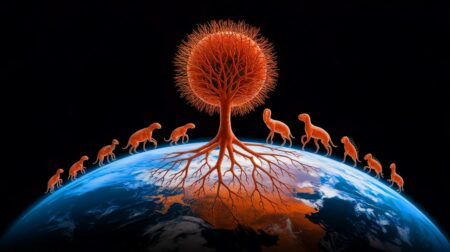Tropical forests may be local to the tropics, yet they all have global benefits. In addition to serving as refuges of the planet’s stunning, if shrinking, biodiversity, these forests store large amounts of carbon, which helps offset our emissions and mitigate climate change.
And some tropical forests, like those on mountains in Africa, store even more carbon than scientists thought.
To wit: these mountain forests store around 150 tons of carbon per hectare, which means that a hectare of them stores enough carbon to offset the equivalent of powering 100 homes with electricity for a year or of driving a gasoline-powered car for nearly 2 million kilometers.
That amount is far more than previous scientific estimates and it comes courtesy of an international team of scientists behind a new study published in the journal Nature, who measured some 72,000 trees at 44 mountain sites across 12 African countries from Guinea to Ethiopia to Mozambique, carefully recording the diameter, height and species of every tree in select areas.
The scientists say they were surprised by their findings. “The results are surprising because the climate in mountains would be expected to lead to low carbon forests,” notes Aida Cuni-Sanchez, a scientist at the University of York’s Department of Environment and Geography and at Norwegian University of Life Sciences.
“The lower temperatures of mountains and the long periods they are covered by clouds should slow tree growth, while strong winds and steep unstable slopes might limit how big trees can get before they fall over and die,” Cuni-Sanchez explains.
“But unlike other continents, in Africa we found the same carbon store per unit area in lowland and mountain forests. Contrary to what we expected, large trees remain abundant in mountain forests, and these large trees (defined as having diameters over 70 cm) store a lot of carbon,” the scientist adds.
These tropical forests are different in some ways from all others found on Earth, the scientists say.
“While we know what makes African forests special, we don’t yet know why they are different,” Cuni-Sanchez observes. “It is possible that in Africa the presence of large herbivores such as elephants plays an important role in mountain forest ecology, as these large animals disperse seeds and nutrients, and eat small trees creating space for others to grow larger, but this requires further investigation.”
However, like most tropical forests worldwide, these mountainous (or “montane”) forests in Africa too are coming under increasing threats of deforestation. The scientists estimate that around 0.8 million hectares of the continent’s old-growth montane forest have been felled over the past two decades.
“About 5 percent of Africa’s tropical mountain forests have been cleared since 2000, and in some countries the rate exceeds 20 percent,” explains Phil Platts, a scientist at the University of York’s Department of Environment and Geography.
“Besides their importance for climate regulation, these forests are habitats for many rare and endangered species, and they provide very important water services to millions of people downstream,” he says.
The unique role of these forests in biodiversity conservation and carbon storage must provide further impetus to us to save them from any further harm, the scientists stress.
“We hope that these new data will encourage carbon finance mechanisms towards avoided deforestation in tropical mountains,” Platts says. “As outlined in the Paris Agreement, reducing tropical deforestation in both lowland and mountain forests must be a priority.”
Did you like it? 4.6/5 (27)








